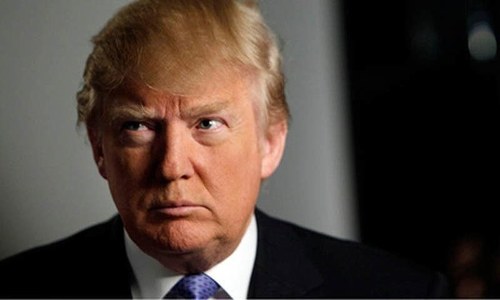A coalition of Muslim and Iranian-American advocates and a nonpartisan legal institute filed the first lawsuits against the Trump administration's new travel restrictions for citizens of eight countries, including Iran, that were announced late last month.
The suits were filed Monday in federal courts in New York and Maryland.
The Trump administration in September announced the most recent restrictions, which affect citizens of Chad, Iran, Libya, North Korea, Somalia, Syria, and Yemen and some Venezuelan government officials and their families. They are to go into effect Oct 18.
One lawsuit, filed Monday night in United States (US) District Court for the Southern District of Maryland on behalf of the Iranian Alliance Across Borders and six individuals, argues that restricting travel for citizens of predominantly Muslim countries violates the US Constitution.
A second suit, filed hours earlier in the US District Court for the Southern District of New York on behalf of the Brennan Center for Justice at New York University, seeks to compel the State Department to comply with a Freedom of Information Act request and turn over documents submitted to the White House by the Department of Homeland Security detailing the information-sharing practices of foreign countries and justifying the decision to exclude travellers from select countries.
The US Department of Justice did not immediately respond to a request for comment Monday.
The White House referred questions to the State Department, which declined to comment on ongoing litigation.
US President Donald Trump on Sept 24 issued a proclamation outlining the new travel restrictions.
Administration officials said the latest version is the result of a lengthy process, based on an objective assessment of each country's security situation and willingness to share information with the US.
It was the administration's third measure to limit travel after a broad ban that sparked chaos at US airports in January and numerous challenges in courts across the country.
The administration later issued a temporary order after suffering legal setbacks on the earlier attempt at restrictions.
The Iranian Alliance Across Borders lawsuit is filed against Trump, acting Secretary of Homeland Security Elaine Duke, acting Commissioner of US Customs and Border Protection Kevin McAleenan, acting Director of US Citizenship and Immigration Services James McCament, Attorney-General Jeff Sessions and Secretary of State Rex Tillerson.
The suit argues that simply adding two countries that are not majority-Muslim to the list is only “an effort to disguise the Proclamation's targeting of Muslims.”
Such discrimination violates the First Amendment and the Immigration and Nationality Act, the suit says. The group is asking for a nationwide injunction to stop the restrictions from going into effect.
“Despite President Trump's attempts to cloak this latest iteration of his Muslim ban in religiously neutral garb by invoking a national security review and including North Korea and Venezuela, the purpose and effect of the Proclamation remain unchanged: to keep Muslims from entering the United States.”
The prior ban included Sudan but didn't include Chad, North Korea or Venezuela.
The new measures range from an indefinite ban on visas for citizens of Syria to more targeted limitations.
Iranians, for example, will not be eligible for immigrant, tourism or business visas but remain eligible for student and cultural exchange visas if they undergo additional scrutiny.
Johnathan Smith, legal director for Muslim Advocates, an organisation representing the plaintiffs in both lawsuits, said the complaints take issue with both the impact of the travel restrictions and the process by which they were developed.
“You can't ignore the fact that this ban affects heavily Muslim countries, and the fact that they attempt to obscure that bias by adding two countries North Korea and Venezuela that don't have a Muslim majority doesn't negate the fact that at its core, this policy is about blocking entry of Muslim individuals into the United States,” Smith said.
“In addition to the challenge of constitutionality to the program, it's equally important to bring some transparency, some light, some sunshine to these processes so all Americans can see what's happening and make their own judgements and assessments about what the White House and federal agencies are doing.”
The American Civil Liberties Union and other groups previously sued the administration over its original travel ban on visitors from six majority-Muslim countries.
Last week, the ACLU announced that it planned to amend its existing lawsuit to include the latest restrictions, and seek to stop the suspension of visas and other entry restrictions.
Justice Department spokesman Ian Prior said in an email Friday that the agency “will continue to vigorously defend the President's inherent authority to keep this country safe.”












































